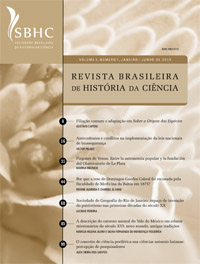Background and conflicts in the implementation of laws of national biosafety
DOI:
https://doi.org/10.53727/rbhc.v3i1.344Keywords:
law, biosafety, biotechnology, history, BrazilAbstract
The aim of this article is to make an historical of the Brazilian biosafety legislation from the elaboration and implementation of the law 8974/05 and the law which succeeded it (11.105/05). The focus of this legislation’s evolution is the struggles around the attributions and decisions of the National Technical Biosafety Commission (CTNBio). Those struggles reveal a phenomenon of scientific knowledge demarcation according to the positioning of social actors, economic interests and confrontation at different levels of the public administration. The conclusion is that the interpretation of the biosafety law subject (analysis and management of genetically modified organism risk) far from being the result of a technical-scientific discussion process, marked by a supposed academic and objectivity neutrality, reveals it as an instrument of political economic and personal interests intermediated by science.
Downloads
Downloads
Published
Issue
Section
License

This work is licensed under a Creative Commons Attribution-NonCommercial-NoDerivatives 4.0 International License.



















